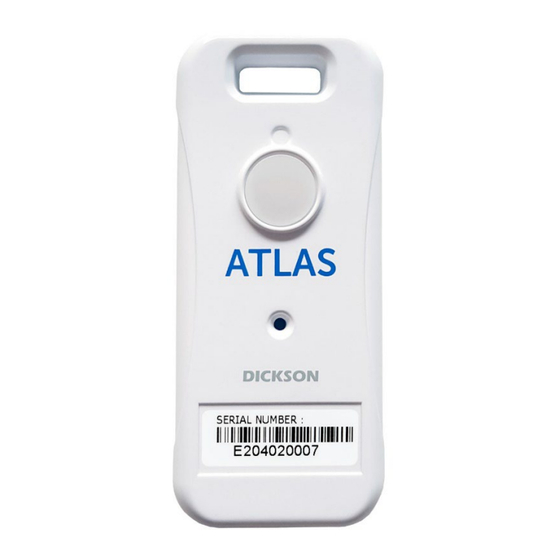
Subscribe to Our Youtube Channel
Summary of Contents for Dickson Atlas
- Page 1 User Guide Atlas ™ Data logger & wireless sensor Temperature • Light • Relative humidity...
-
Page 2: Notices And Safety
Introduction Notices and safety Disclaimer Dickson assumes no liability for any loss or claims by third parties which may arise through the use of this product. Users must not use the product in any manner not specifically limitation of indicated by Dickson. -
Page 3: Certifications And Compliance
Introduction Certifications and compliance Caution: Any changes or modifications made to this product not expressly approved in writing by Dickson could void the user's authority to operate the equipment. FCC statement This device complies with part 15 of the FCC rules. - Page 4 This device is compliant with the restriction of the use of certain hazardous substances in electrical and electronic equipment Directive 2002/95/EC (RoHS Directive). Do not dispose of this product with household trash. Dickson recycles this product under certain conditions. Please contact us for more information.
- Page 5 Google Inc. The Bluetooth® word mark and logos are owned by the Bluetooth® SIG, Inc. All other brands are the property of their respective owners. Smartphone or tablet device not included with Dickson product purchase. This is a non- contractual document. Specifications subject to change without notice. Product photos and features may vary.
-
Page 6: Table Of Contents
1.3.1 OCEAView Mobile ....................8 1.3.2 OCEAView Cloud or On-premises ..............9 1.3.3 OCEAView Legacy ....................9 1.3.4 Using Atlas as a remote wireless sensor with Cobalt X ....... 9 1.4 Placing your Atlas data logger ..............10 1.5 Atlas features....................11 1.5.1 Wireless technologies .................. -
Page 7: Introduction
Dickson’s Atlas is a Bluetooth-enabled wireless data logger designed for monitoring temperature, humidity, and light sensitive products during shipping. Atlas may also be used as a remote wireless sensor, paired with Cobalt X data loggers and connected via Bluetooth. With its small footprint, Atlas fits conveniently inside many types of product packaging and containers, where it records temperature, relative humidity, and light levels according to parameters that you can define for your specific needs. -
Page 8: Package Contents
Adhesive tape for mounting 1.3 Companion products The Atlas datalogger is designed to work with several different types of companion products from Dickson, in particular, depending on the volume of modules you intend to use, and whether or not you wish to use the OCEAView Cloud or On- premises monitoring platform. -
Page 9: Oceaview Cloud Or On-Premises
1.3.4 Using Atlas as a remote wireless sensor with Cobalt X Atlas can be used as a wireless sensor with Dickson’s Cobalt X data loggers. In this scenario, the Atlas device does not store sensor readings, but rather transmits them to a paired Cobalt X data logger. -
Page 10: Placing Your Atlas Data Logger
Introduction 1.4 Placing your Atlas data logger Atlas is designed to be placed directly inside product package container whose temperature you would like to monitor. Depending on the situation, you may choose to use the provided adhesive to fix the datalogger to the side of the container or leave it loose inside a product box. -
Page 11: Atlas Features
Introduction 1.5 Atlas features 1.5.1 Wireless technologies • Bluetooth® Low Energy for reading and transmitting data Range: Up to about 50 meters (160 ft.) in line-of-sight Frequency (worldwide): 2.4 GHz Max output: 4 dBm • NFC (Near-field Communication) Range: About 4 cm (1.6 in.) •... -
Page 12: Operating And Storage Conditions
The shelf life (before first use) depends mainly on the storage temperature. To benefit from a full year of operation we recommend storing Atlas data loggers at around 25°C (77°F). See Appendix 1 – Atlas battery life on page 16 for estimated operating and storage times Atlas User Guide... -
Page 13: Using Your Atlas Data Logger
When you want to program your Atlas device via Bluetooth using OCEAView Mobile, you must first activate it. To activate an Atlas data logger: 1. Press and hold the pushbutton on the front of the Atlas module for 3 seconds. Atlas User Guide... -
Page 14: Using The Led To Check Module Status
2.1.2 Using the LED to check module status The color LED on the front of the Atlas module indicates module status. The LED on Atlas modules is activated by pressing the button on the front of the module,... -
Page 15: Maintaining Your Data Logger
Maintaining your data logger 3 Maintaining your data logger 3.1 Cleaning Instructions You occasionally may need to clean your Atlas modules depending on site or environmental conditions. Here are some recommendations and guidelines for cleaning your modules: • Clean using a soft cloth with water, a detergent or isopropanol. -
Page 16: Appendix 1 - Atlas Battery Life
Appendix 1 – Atlas battery life 4 Appendix 1 – Atlas battery life Many factors have an influence on Atlas battery life, both during use and in storage before being used. Here are the main considerations to take into account when evaluating product battery life: •... -
Page 17: Estimated Operating Lifetime
Appendix 1 – Atlas battery life 4.2 Estimated operating lifetime The following chart shows estimated Atlas operating lifetime based on: • Storage for 1 year before first use • 1 reading per minute Atlas battery operation estimation after 12 months in storage... -
Page 18: Estimated Shelf-Life (Storage Prior To Use)
Appendix 1 – Atlas battery life 4.3 Estimated shelf-life (storage prior to use) Atlas is designed to provide operation for 12 months, generally on a single mission. To ensure 12 months of reliable operation, it is important for the product to be used within a reasonable period of time after manufacturing. - Page 19 Appendix 1 – Atlas battery life Atlas User Guide Page 19...








Need help?
Do you have a question about the Atlas and is the answer not in the manual?
Questions and answers